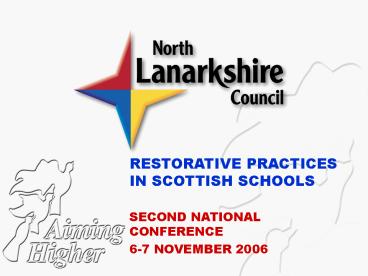RESTORATIVE PRACTICES IN SCOTTISH SCHOOLS - PowerPoint PPT Presentation
1 / 25
Title:
RESTORATIVE PRACTICES IN SCOTTISH SCHOOLS
Description:
There is a link between deprivation and underachievement, a link which ... Wrong doing or harm. Problem solving. Dialogue negotiation. Restitution/ reparation ... – PowerPoint PPT presentation
Number of Views:159
Avg rating:3.0/5.0
Title: RESTORATIVE PRACTICES IN SCOTTISH SCHOOLS
1
- RESTORATIVE PRACTICES IN SCOTTISH SCHOOLS
- SECOND NATIONAL CONFERENCE
- 6-7 NOVEMBER 2006
2
The Challenge to break the links between
disadvantage and underachievement
3
RAISING ACHIEVEMENT FOR ALL KEY THEMES
- concept of multiple intelligences motor,
spatial, - aesthetic, mathematical, linguistic,
scientific, emotional
- achievement across a range of fronts social,
creative, - cultural, sporting, academic experiences
valued equally
- importance of self-esteem, motivation,
determination, - aspiration - the development of the whole
person
- producing well-rounded, enthusiastic,
self-motivated - and successful learners - at all levels of
ability
- directing resources to groups currently
underachieving
4
The Restorative Approach is essentially a
philosophy, not a template and ought to guide
the way we act in our dealings with others.
5
THE UNDERPINNING MODEL
PROCEDURES PRACTICES
SKILLS
PHILOSOPHY VALUES ETHOS
6
A FORMAT CONTINUUM
STAGES MODEL
STRUCTURE
SKILLS
Active Listening Empathy Counselling
Script
7
RELATEDSKILLS / COMPETENCES
- Empathy
- Emotional Literacy
- Interpersonal/Relationship Skills
- Cognitive/Social Skills
8
TWO MODELS OF DISCIPLINE
- TRADITIONAL
- Rule breaking
- Blame or guilt
- Adversarial
- Punish to deter
- Impersonal
- Those harmed ignored
- Accountability being punished
- RESTORATIVE
- Wrong doing or harm
- Problem solving
- Dialogue negotiation
- Restitution/ reparation
- Interpersonal
- Empowerment
- Accountability put things right
9
THE SOCIAL DISCIPLINE WINDOW
HIGH
restorative
punitive
Control (Limit Setting Discipline)
permissive
neglectful
HIGH
Support (Encouragement, Nurture)
LOW
10
CLASSROOM/SCHOOL CULTURE
HIGH
Consistent Responsive Flexible Accountable
Responsible Cooperation Negotiation
Power Struggles Confrontation Authoritarian Win-Lo
se Retribution Stigmatising
Control
TO
WITH
Uncaring Tired Lazy Burnt Out Given Up
NOT
FOR
Chaotic Inconsistent Excusing Giving In Blurred
Boundaries Rescuing
HIGH
Support
LOW
11
MASLOWS HIERARCHY OF NEEDS
- 5 universal levels of human need
Self-actualisation
Self-esteem
Love,affection and belonging
Safety /Security
Physiological (Survival)
12
MASLOWS HIERARCHY OF NEEDS ????????
- 5 universal levels of human need
Love,affection and belonging
Self-esteem
Self-actualisation
Safety /Security
Physiological (Survival)
13
MODEL OF MOTIVATION
Classroom Environment
Based on work by A. MacLean, 2002
14
FAIR PROCESS
Individuals are most likely to trust and
cooperate freely with systems whether they
themselves win or lose by those systems when
fair process is observed.
- The 3 principles
- Engagement
- Explanation
- Expectation clarity
W. Chan Kim and Renee Mauborgne Harvard Business
Review, July-August 1997
15
ENGAGEMENT
Involving individuals in decisions that affect
them by asking for their input and allowing them
to refute the merit of one anothers ideas and
assumptions.
16
EXPLANATION
Everyone involved and affected should understand
why final decisions are made as they are. Creates
a powerful feedback loop that enhances learning.
17
EXPECTATION CLARITY
Once decisions are made, new rules are stated
clearly, so that all involved understand the new
standards and the penalties for failure to comply.
18
WHAT FAIR PROCESS ISNT
- Decisions by consensus
- Does not set out to achieve harmony
- Does not set out to win peoples support through
compromises that accommodate every individuals
opinion, needs or interests - Democracy in the classroom/school
- Teachers/Managers forfeiting their prerogative to
make decisions, establish policies, procedures
and standards.
19
CURRENT INITIATIVES
Primary Secondary
PAThS
?
?
Reasoning Reacting
?
Staged Intervention
?
?
?
Solution Oriented Schools
?
Cooperative Learning
?
?
?
Circle Time
?
?
Restorative Practices
20
LEVELS OF FOCUS
HEALING RELATIONSHIPS REPAIRING HARM
Formal Conferencing Formal Mediation
Minority
MAINTAINING RELATIONSHIPS RESOLVING
CONFLICT
Problem Solving Circles Restorative
Questions Peer Mediation Solution Oriented
Restorative Culture Skills Training PAThS Cooperat
ive Learning Reasoning and Reacting Circles
GROWING HEALTHY
RELATIONSHIPS PREVENTING HARM/CONFLICT
Whole School
21
INTRODUCING RESTORATIVE PRACTICES
- 2002 - Training in Restorative Conferencing
- Wish to embed more in whole school approach
- Awareness raising for School Staff via Head
Teachers meetings and within individual schools - 2003 - Lead Authority in SEED Pilot in R.P.
- 2003/04 - Link with Safer Saner Schools
Philadelphia - study visit - 2004/2005 - Initiation of a major Training
Programme in a variety of Restorative Practices - 2005/2006 - Focus on the embedding of Restorative
Culture in Schools
22
TRAINING
- Primary - Transforming Conflict
- 5 Cohorts 8 days ( Total 100 Staff)
- Secondary - Designed and Delivered
- 3 Cohorts 4 days (Total 60 Staff)
- Peer Mediation
- 5 Cohorts 2 days ( 200 Pupils)
- Circle Time
- 1 Cohort - 1 day (30 Staff)
- Training 15-20 May 2005 - (Bob Costello IIRP)
- For key staff in Secondary Schools
- Significant number of places available for other
authorities - Management of Change Training - Marg Thorsborne
- 3-5 Year process
- Leadership
- Whole School
23
INDICATORS/SIGNIFICANT FACTORS
- Local Positive response to training Parental
Awareness Demand for Information Dissemination -
Leaflets for Pupils and Parents - National
- Joint Team - Glasgow and Edinburgh Universities
- 6 Schools in each of 3 Pilot Authorities
- Soft and Hard Indicators
- Outcomes
- Built in as opposed to Bolt on
- Built on existing good practice e.g. Circle Time
- Visionary Leadership and Support
- Strategic Planning and Funding
24
Brian Steele Principal Psychologist steeleb_at_nort
hlan.gov.uk
25
Brian Steele Principal Psychologist steeleb_at_nort
hlan.gov.uk































